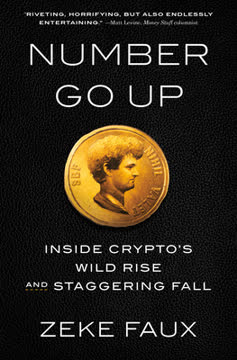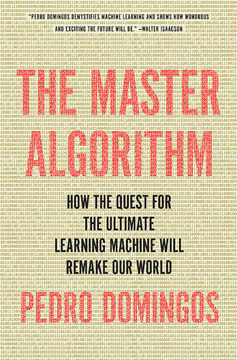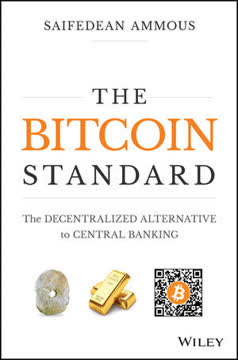Key Takeaways
1. Blockchain: A revolutionary "truth machine" for the digital age
Blockchains point the entire digital economy toward something people are calling the Internet of Value.
A new paradigm for trust. Blockchain technology represents a radical shift in how we manage and verify information in the digital age. At its core, a blockchain is a distributed, append-only ledger that creates an immutable record of transactions without relying on a central authority. This decentralized approach to record-keeping has far-reaching implications beyond just digital currencies.
Key features of blockchain technology:
- Distributed: No single point of failure
- Cryptographically secure: Tamper-evident and highly resistant to manipulation
- Transparent: Open for public scrutiny while maintaining privacy
- Consensus-driven: Agreed-upon rules for updating the ledger
By providing a shared, verifiable source of truth, blockchains have the potential to revolutionize how we conduct business, manage identities, and interact with digital systems across various industries.
2. The crisis of trust and the need for a new economic infrastructure
Trust—particularly trust in our institutions—is a vital social resource, the true lubricant of all human interaction.
Eroding faith in institutions. The 2008 financial crisis exposed deep flaws in our economic systems and institutions, leading to a widespread loss of trust. This erosion of confidence extends beyond just banks to governments, media, and corporations. The centralized nature of these entities makes them vulnerable to corruption, manipulation, and cyber attacks.
Consequences of the trust deficit:
- Economic instability and reduced risk-taking
- Political polarization and the rise of populism
- Increased costs for verification and intermediation
- Limited access to financial services for marginalized populations
Blockchain technology offers a potential solution by creating transparent, tamper-resistant systems that don't rely on centralized authorities. By distributing trust across networks of participants, it could help rebuild confidence in our economic and social infrastructure.
3. Bitcoin's breakthrough: Decentralized consensus and digital scarcity
Bitcoin tackled this problem by reimagining the ledger itself.
Solving the double-spend problem. Bitcoin's true innovation wasn't just digital cash, but a system for achieving consensus among untrusting parties without a central authority. Through a combination of cryptography, game theory, and economic incentives, Bitcoin created the first truly scarce digital asset.
Key components of Bitcoin's consensus mechanism:
- Proof-of-work: A resource-intensive puzzle that makes fraud costly
- Mining rewards: Economic incentives for honest participation
- Distributed ledger: A shared, verifiable transaction history
By solving the double-spend problem for digital assets, Bitcoin opened up possibilities far beyond just currency. It demonstrated that decentralized systems could manage valuable information and transactions without traditional intermediaries, paving the way for new forms of digital ownership and exchange.
4. Beyond currency: Smart contracts and the token economy
If we view the bitcoin currency from this angle...we can build a conceptual framework for understanding the wider implications of Satoshi's invention.
Programmable money and assets. Smart contracts, pioneered by platforms like Ethereum, extend blockchain capabilities beyond simple value transfer. These self-executing agreements allow for complex, automated transactions and the creation of digital tokens representing various forms of value.
Applications of smart contracts and tokens:
- Decentralized finance (DeFi): Lending, borrowing, and trading without banks
- Non-fungible tokens (NFTs): Unique digital assets for art, collectibles, and more
- Tokenized real-world assets: Fractional ownership of property, commodities, etc.
- Decentralized Autonomous Organizations (DAOs): New models for collective governance
The token economy enables more fluid, programmable representations of value and rights. This could lead to more efficient markets, increased liquidity for traditionally illiquid assets, and new models for incentivizing collective behavior.
5. Reimagining industries: Supply chains, energy, and the Internet of Things
Functioning as a kind of societal glue, trust makes possible the multiple exchanges we enter into every day, little deals that we can't imagine taking to court but which nonetheless carry some agreed expectation of mutual exchange.
Transforming legacy systems. Blockchain technology has the potential to revolutionize how entire industries operate by providing transparent, efficient, and secure ways to track and transfer value. Supply chains, energy grids, and the Internet of Things (IoT) are prime candidates for blockchain-enabled transformation.
Industry-specific blockchain applications:
- Supply chains: End-to-end traceability and provenance tracking
- Energy: Peer-to-peer trading in decentralized microgrids
- IoT: Secure device-to-device transactions and data sharing
- Healthcare: Interoperable medical records and drug traceability
- Government: Transparent voting systems and public records
By reducing friction, increasing transparency, and enabling new forms of collaboration, blockchain technology could lead to more efficient and equitable systems across various sectors of the economy.
6. The challenge of digital identity and self-sovereign data
If we absorb the historical lessons...about the ultimate victory that open Internet protocols like TCP/IP had over closed, walled-garden "intranets"...we see the inherent limits of these permissioned blockchain proposals.
Reclaiming control of personal data. As our lives become increasingly digital, the question of who controls our data and identities becomes crucial. Blockchain technology offers a potential path to self-sovereign identity, where individuals have greater control over their personal information and how it's shared.
Key aspects of blockchain-based identity systems:
- Decentralized identifiers (DIDs): User-controlled digital identities
- Verifiable credentials: Cryptographically signed attestations
- Selective disclosure: Sharing only necessary information
- Interoperability: Identity portability across different systems
While technical and regulatory challenges remain, blockchain-based identity solutions could enhance privacy, reduce identity theft, and empower individuals in the digital economy.
7. Governance in the blockchain era: Balancing decentralization and regulation
There's no guarantee that this sweeping vision of a new enabling platform for the global digital economy will come to fruition.
Navigating a new paradigm. The rise of blockchain technology presents significant challenges for existing regulatory frameworks and governance models. Balancing the potential for innovation with the need for consumer protection and financial stability requires careful consideration.
Key governance challenges:
- Regulatory uncertainty: Classifying and overseeing new digital assets
- Cross-border coordination: Harmonizing rules across jurisdictions
- Privacy vs. transparency: Balancing public ledgers with data protection
- Decentralized governance: Evolving models for protocol upgrades and dispute resolution
As blockchain systems mature, finding the right balance between decentralization and necessary oversight will be crucial for their widespread adoption and long-term success.
8. The future of work and creativity in a blockchain-powered world
What's striking is that three of these newcomers now occupy spots on that top-five list: Facebook, Google, and Twitter.
Redefining value creation. Blockchain technology and the token economy have the potential to fundamentally reshape how we think about work, creativity, and value creation. By enabling more direct connections between creators and consumers, and new ways to monetize digital assets, blockchain could empower individuals and disrupt traditional intermediaries.
Potential impacts on work and creativity:
- Micropayments for content: Direct compensation for online contributions
- Tokenized reputation systems: New ways to measure and reward value
- Decentralized platforms: Alternatives to centralized content aggregators
- Collaborative creation: New models for shared ownership and royalties
While the full implications are yet to be realized, blockchain technology could lead to a more democratized and equitable digital economy, where individuals have greater control over their creative output and data.
Last updated:
Review Summary
The Truth Machine: The Blockchain and the Future of Everything receives mixed reviews. Many praise its comprehensive overview of blockchain technology and potential applications, while others criticize its overly optimistic tone and lack of technical depth. Readers appreciate the historical context and real-world examples provided but note that some information may be outdated due to the rapidly evolving field. The book is generally considered a good introduction for beginners, though some find it repetitive and lacking critical analysis. Overall, it offers an accessible exploration of blockchain's potential impact on various industries and society.
Similar Books










Download PDF
Download EPUB
.epub digital book format is ideal for reading ebooks on phones, tablets, and e-readers.




